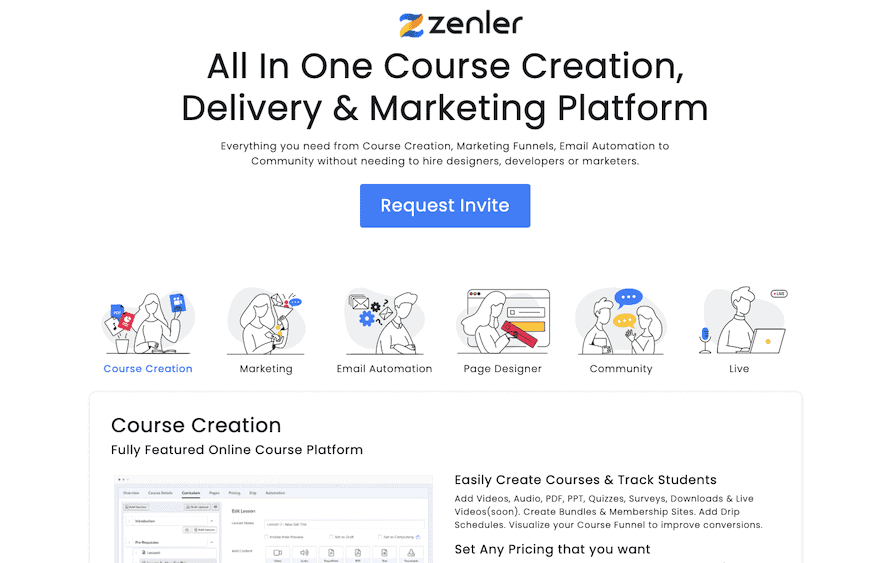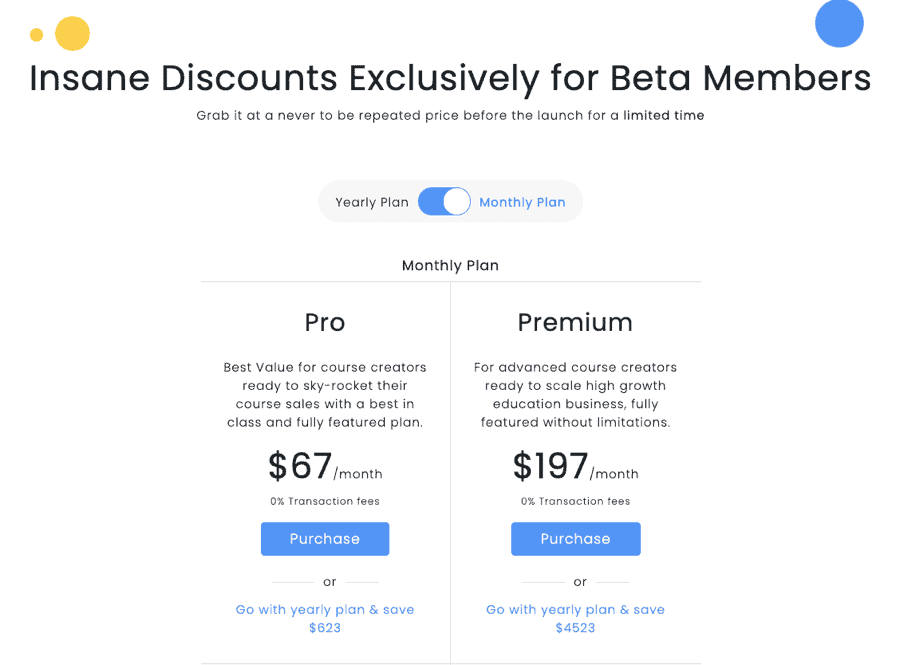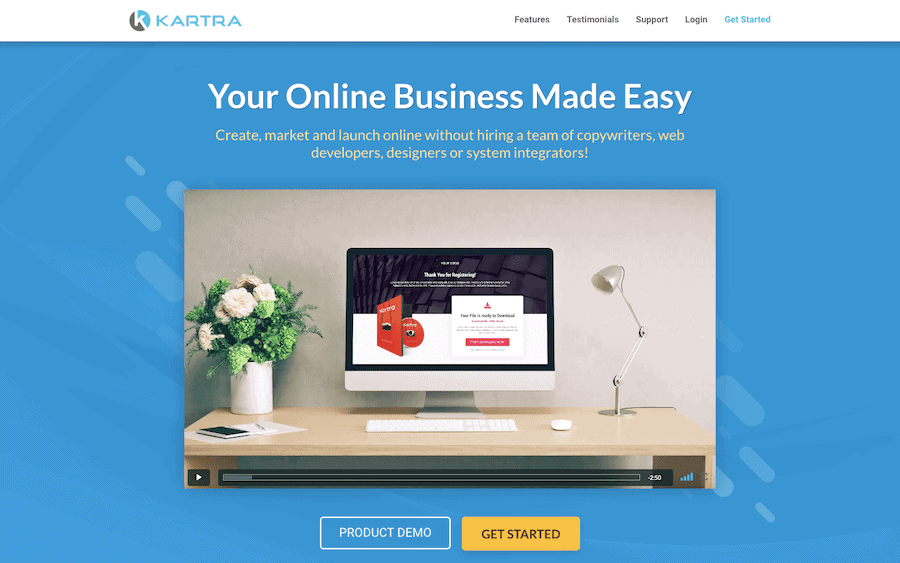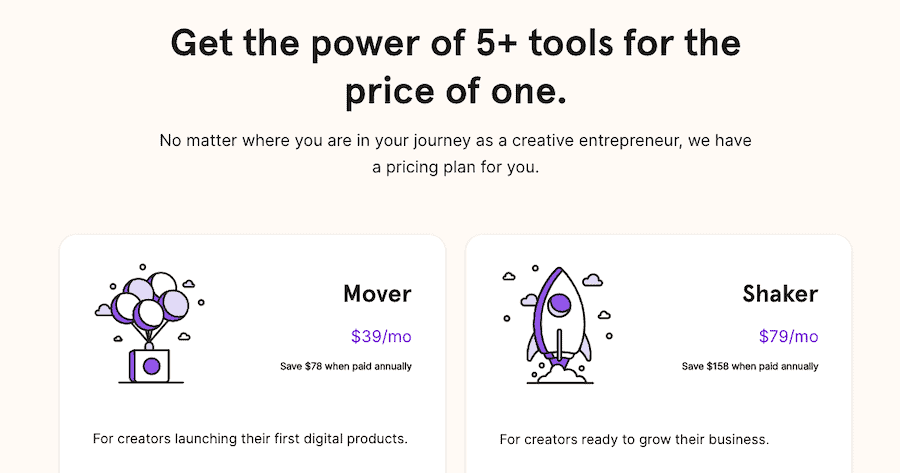home / Best Course Platforms /Kajabi Review
We earn a commission from partner links on this site. This doesn’t affect our opinions or evaluations.
If you’ve landed on this article, you’re exploring options beyond Kajabi.
While Kajabi stands as a premium solution for developing and marketing online courses and membership programs, it certainly doesn’t represent the ideal choice for every content creator.
Several common motivations drive creators to investigate Kajabi alternatives:
With these considerations in mind, let’s explore some outstanding Kajabi alternatives currently available, examining their core functionalities, comparative advantages, and potential drawbacks when measured against Kajabi.
We’ve conducted comprehensive evaluations of each platform and will guide you toward selecting the optimal solution for your enterprise based on your specific requirements and objectives.
Thinkific operates as a dedicated online course platform that, unlike Kajabi, doesn’t incorporate blogging capabilities, sales funnel construction tools, or email marketing functionalities.
Nevertheless, Thinkific represents one of the market’s premier solutions for developing online educational content and fostering student engagement.
This platform enables you to design comprehensive online courses incorporating diverse content formats including videos, written materials, PDF documents, assessment quizzes, participant surveys, homework assignments, and more, while delivering this content through the integrated course player and even supporting dedicated community spaces.

Beyond these core capabilities, Thinkific delivers several powerful educational and engagement functionalities currently unavailable within Kajabi:
In addition to robust course development tools, Thinkific supports website creation, payment processing, course package development, subscription sales, and similar functionalities.
A particularly valuable advantage is Thinkific’s dedicated application marketplace featuring numerous third-party integrations, allowing significant expansion of your platform’s foundational capabilities.
Another notable benefit Thinkific offers compared to Kajabi is its accessibility for beginning entrepreneurs. The platform provides a free tier granting access to essential features, perfectly suited for initial market testing.
Furthermore, their premium subscriptions maintain reasonable pricing structures. Their Basic package costs $49/month, while the Pro subscription runs $99/month. Unlike Kajabi’s approach, Thinkific imposes no restrictions on course quantity or student enrollment within your educational platform.


Beyond its educational tools, New Zenler provides comprehensive features to manage your marketing and sales activities — customizable website templates, flexible pricing structures, membership tier capabilities, optimized checkout experiences, European VAT compliance, secure payment processing, and more.
Furthermore, the platform enables you to construct marketing funnels, implement automated email sequences, and administer your own affiliate marketing initiatives.
Despite New Zenler’s impressive arsenal of capabilities, it doesn’t quite reach Kajabi’s feature sophistication. Several tools, including the funnel creation system and email marketing functionality, remain somewhat elementary in comparison.
Nevertheless, what positions New Zenler as an excellent Kajabi alternative is its exceptional value proposition. Its cost structure is significantly more accessible than Kajabi pricing, establishing it as the most budget-friendly all-inclusive course platform available.
The Pro subscription requires $67/month, while the Premium package costs $197/month. Both options include all platform capabilities, with variations primarily in contact collection limits and the number of websites you can operate within the New Zenler ecosystem.

Teachable represents another widely-used online course platform that, similar to Thinkific, concentrates specifically on delivering essential functionalities for creating and marketing online educational content.
The platform provides a robust learning management system alongside fundamental tools for commercializing your courses. However, it lacks advanced marketing capabilities such as email sequence automation or sales funnel development.
At its core, Teachable empowers you to build courses incorporating videos, audio files, PDFs, assessment tools, and supports educational features including scheduled content release, scored examinations, completion requirements, achievement certifications, and more.
Furthermore, you can distribute your educational materials to subscribers through its thoughtfully engineered course player. While this interface adapts seamlessly to mobile browsers, the platform doesn’t offer dedicated mobile applications for your learners.


Although Teachable cannot match Kajabi’s extensive feature set in any category, it provides a more accessible pricing structure for newcomers. Its exceptionally generous free option makes Teachable particularly well-suited for emerging course creators operating with limited financial resources.
Mighty Networks stands apart uniquely from other online course platforms featured in this review. At its foundation, it functions as an online community platform, with additional educational course creation functionality integrated into its ecosystem.
While Kajabi does offer community-building capabilities, these features lack the same depth and sophistication. In particular, Kajabi misses several fundamental community engagement tools, positioning Mighty Networks as a superior Kajabi alternative for community-focused creators.
Mighty Networks enables you to develop comprehensive articles, engaging posts, interactive polls, and discussion questions, categorize your content using topical structures, schedule one-time or repeating events, host live broadcasts, and more.
As a community administrator, you can establish specialized sub-groups within your primary community and selectively control access to these spaces for specific member segments.
Your participants can engage with the community either through web browsers or via the dedicated mobile application. Additionally, they receive customized activity streams, can establish connections with fellow members, exchange private messages, and access various interaction features.

Kartra positions itself as a comprehensive business platform and has risen to become one of the most sought-after Kajabi alternatives during recent years.
Unlike Kajabi’s specific focus on knowledge-based enterprises, Kartra serves a broader audience, accommodating various business models including eCommerce ventures, software-as-a-service offerings, and numerous other commercial applications.
A significant distinction lies in Kartra’s foundation as primarily a sales and marketing solution, which results in its delivery of more sophisticated and comprehensive functionality, particularly advanced marketing automation capabilities.

Podia stands out as the most user-friendly online platform that enables you to market online courses, membership programs, and digital products with remarkable simplicity. Its streamlined and intuitive interface empowers content creators to develop and introduce their offerings online without technical complications.
Regarding educational content creation features, Podia resembles Teachable in many ways. It provides drag-and-drop course construction tools, a thoughtfully designed content delivery interface, and supports functionalities including basic assessment options, scheduled content release, completion certificates, and similar features.
Nevertheless, Podia offers limited options for learning enhancement and student engagement tools. The platform doesn’t support scored assessments, homework submissions, prerequisite content requirements, or comparable advanced educational features.


Therefore, Podia doesn’t distinguish itself through exceptional or exclusive features. Rather, its competitive advantage lies in its straightforward interface and operational simplicity, making it particularly well-suited for entrepreneurs seeking a cost-effective platform to develop straightforward educational content or subscription-based offerings.
LearnDash represents another widely-adopted learning management system, but distinguishes itself as a WordPress-based solution rather than a self-contained platform.
Most cloud-hosted educational platforms, including Kajabi, operate as closed ecosystems, limiting your ability to expand their capabilities. For instance, Kajabi lacks built-in achievement-based motivation features, with no straightforward method to incorporate this functionality into your educational website.
This particular scenario highlights the advantage of WordPress-integrated solutions like LearnDash. It provides numerous complimentary and premium extensions that deliver unparalleled flexibility regarding your learning management system’s functionality.
For example, if your educational offering requires sophisticated achievement and reward mechanisms, you can implement this seamlessly using the GamiPress extension.
Furthermore, the fundamental plugin package is comprehensive and incorporates all essential learning management functionalities including intuitive course construction tools, scored assessment options, homework submission capabilities, completion certifications, prerequisite content requirements, scheduled content delivery, and similar educational features.

ClickFunnels functions primarily as a marketing funnel creation platform enabling you to efficiently develop conversion pathways incorporating lead capture pages, product promotion pages, and transaction processing pages. While it doesn’t serve as a direct equivalent to Kajabi, it can nonetheless function as an effective alternative in particular circumstances.
ClickFunnels marketing sequence builder delivers more comprehensive functionality than Kajabi’s pipeline creation system. It provides frameworks for additional conversion pathway categories, and within each category, offers numerous design templates—a feature not available within Kajabi’s ecosystem.
Consequently, regardless of which marketing sequence structure you wish to implement, you’ll discover a pre-designed template matching your specifications, allowing you to construct marketing funnels with greater efficiency.

ClickFunnels incorporates built-in marketing sequence automation capabilities. However, this functionality necessitates integration with external email delivery services and presents significant usability challenges.
Additionally, ClickFunnels offers membership area construction tools, but these provide only rudimentary functionality. The system lacks numerous critical features including video content hosting, assessment capabilities, participant discussion forums, and other essential elements.
Furthermore, the membership environment suffers from poor design considerations from the participant perspective. It lacks mobile device optimization, which represents a potentially significant limitation for many content creators.
Consequently, I wouldn’t recommend implementing ClickFunnels for your educational content delivery needs.
However, if you’re currently utilizing an educational platform such as Thinkific and seeking a Kajabi alternative specifically for marketing sequence development, ClickFunnels represents an excellent solution for this particular requirement.

Patreon functions as a subscription platform specifically designed for creative professionals. Unlike Kajabi, it doesn’t provide comprehensive membership portal development capabilities.
The platform delivers only fundamental elements such as promotional page creation, subscriber communication through updates, direct messages, and newsletters, subscription level establishment, recurring payment processing, and similar core functions.
Patreon lacks integrated educational content creation or community engagement functionalities. Should you require these capabilities, you’ll need to connect the platform with external solutions such as WordPress, Discourse, or comparable alternatives.

Throughout this article, we’ve examined the leading Kajabi alternatives available today and explored each platform’s distinctive capabilities, advantages, and limitations.
The optimal solution for your specific needs will vary depending on your reasons for seeking a Kajabi alternative and your particular feature requirements.
If you’ve thoroughly reviewed this guide, you should now possess the knowledge to select the most suitable Kajabi alternative for your situation. However, if you’re still contemplating your options, allow me to provide a concise recommendation summary:
Conversely, if you’re searching for an integrated solution with more budget-friendly pricing structures, New Zenler merits your consideration.
Should your primary goal involve establishing a community-focused enterprise rather than a conventional educational business online, we recommend investigating Mighty Networks as your platform of choice.
Do you have additional questions regarding any of these Kajabi alternatives? Perhaps insights about these platforms you’d like to contribute? Please share your thoughts in the comments section below – we value your feedback and experiences.

Daniel NicFounder, SellingOnliceCoursesGuide.comis an entrepreneur and digital education specialist who founded sellingonlinecoursesguide.com, a platform dedicated to helping creators and educators successfully navigate the online course marketplace. Through his website, he shares insights and strategies for developing, marketing, and monetizing online educational content. His work focuses on empowering course creators to build sustainable online businesses while effectively sharing their knowledge with students worldwide.
Our Top Picks

Daniel Nic is an entrepreneur and digital education specialist who founded sellingonlinecoursesguide.com, a platform dedicated to helping creators and educators successfully navigate the online course marketplace. Through his website, he shares insights and strategies for developing, marketing, and monetizing online educational content. His work focuses on empowering course creators to build sustainable online businesses while effectively sharing their knowledge with students worldwide.

We respect your privacy and will never spam you.